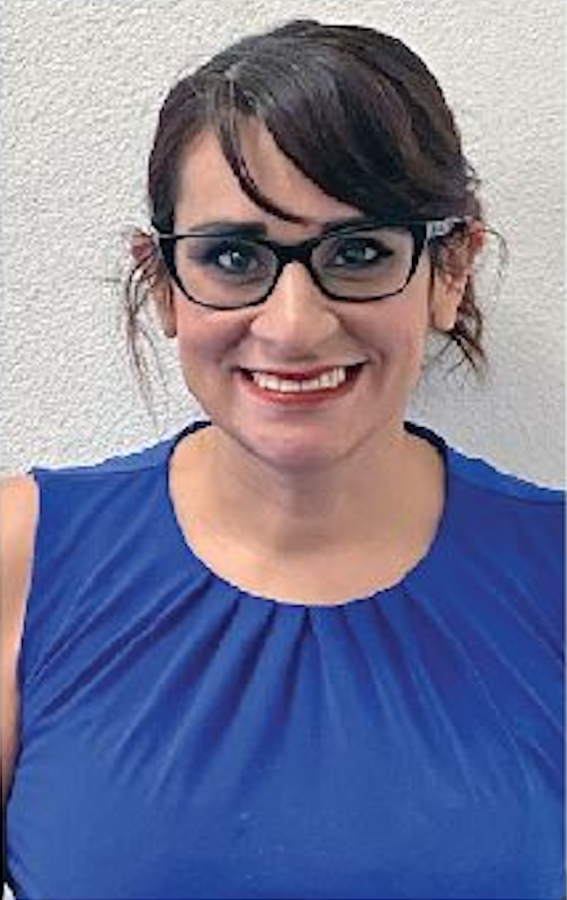Mrs. Alexis Kling
October 1, 2020
Amidst the new social distance learning procedures set, the SMHS staff also welcomes new faces, including Alexis Kling. The mother of two is one of the new members of the SMHS family this fall, working in the Special Education department.
Kling graduated from Montebello High School and proceeded to attend the University of La Verne to earn her bachelor’s degree in Psychology, as well as a Master’s degree in Education from the same institution. In addition, she has teaching credentials from California State University, Los Angeles, more commonly known as Cal State LA, before receiving her Master of Educational Leadership and Administration credentials from Azusa Pacific University.
After her own education, Kling started her teaching career first in a non-public school for students with moderate to severe disabilities in Pasadena, CA. Afterward, she was a high school teacher in a few schools across South Los Angeles, East Los Angeles, and Inglewood for over a decade.
When I asked her why she decided to come to San Marino this year, she replied, “[I came] to grow my teaching pedagogy and professional skillset by learning from the best educators in the field.” Of course, teaching has taken a twist during the global pandemic. As students in states such as New York return to physical school, the San Marino Unified School District, along with several other districts, has set procedures for complete virtual education via Zoom or Google Meets. Upon the inquiry that if she could change one thing about virtual classrooms, Kling responded that she didn’t think there was anything she would change; after all, if there was anything that needed changing, it was most likely already done. However, Kling did state, “I wish there was a way we could be… more cohesive rather than separate.”
As a new staff member, Kling has yet to really meet her students face to face in a physical classroom. “I miss the social interaction, I miss seeing [my students and colleagues] every day,” Kling said. However, there are benefits to social distance learning. As we all adjust to virtual environments, Kling has described it as a learning curve; she has been trying to learn from her colleagues and sought professional help via the Internet. In addition, Kling has also been reading about promoting engagement, which has proven difficult due to the environment. “My favorite part is exploring the technology that’s out there,” she said. Before the pandemic, the Internet was an added benefit, something to enhance education. Now, with SMUSD almost entirely dependent on electronic devices, Kling has been exploring applications. “It’s been fun.” While Kling “thinks it’s hard to learn and hard to process information over a screen,” she’s also admitted that it was much easier, as it removed certain barriers, and is much more convenient; both teachers and students has access the comforts of home, which is a positive view on how the coronavirus has affected us.
Kling enjoys many movies, a particular favorite being Inception, an action and science fiction film directed in 2010 by Christopher Nolan. Black coffee is a favorite beverage, partly for the caffeine; however, she will resort to carbonated sodas if coffee is unavailable. While sushi rolls are a preferred delicacy, Kling has not had many chances to eat out due to the pandemic. At home, with two daughters— one is eight years old, while another is a junior in high school— Kling cooks many homemade meals, mostly consisting of homemade soup, Spanish rice, and many Mexican meals. After pondering, Kling told me how she “[kept] my brain from turning to mush” during the long months of the quarantine. “I read a lot of books, like a lot of books,” Kling said. Her log of books includes tomes from several different genres, ranging from young adult and good literature. Her favorite, however, is what she describes as a unique category invented by Haruki Murakami, a Japanese writer who writes a sort of surrealist fiction.
When I asked her what she thought if another pandemic occurred, her response was immediate. “It’s not a question of if, but of when,” Kling said. Every hundred years, there seemed to be a calamitous disease. In the 1720s, there was the plague. In the 1820s, there was an outbreak of cholera. In 1919, the Spanish Influenza ravaged hundreds of millions of people worldwide. Now, in 2020, the COVID-19 pandemic was so devastating because of how unprepared we all were despite the historical forewarning. “Preparation is key.” She told me that after we felt these consequences, we should look and think forward.
Although Kling and the other new staff members came to SMHS in such a difficult time when we are not able to meet in-person, we still appreciate their presence and diligence, and we hope that sometime soon, we would be able to work together physically.
